Organisational Behaviour Report: A David & Co. Case Study Analysis
VerifiedAdded on 2020/11/12
|16
|4272
|236
Report
AI Summary
This report on organisational behaviour explores the dynamics of workplace culture, power structures, and their impact on individual and team performance within the context of A David & Co. The report delves into the influence of culture, power, and politics, analyzing how these factors shape employee behaviour and productivity. It further evaluates various motivational theories, such as Maslow's hierarchy of needs and ERG theory, to understand how organizations can effectively motivate employees and achieve their goals. The report also examines the factors that contribute to effective versus ineffective team performance, providing insights into team dynamics and strategies for fostering successful collaboration. This report provides a comprehensive overview of key concepts in organisational behaviour and their practical implications for business management.
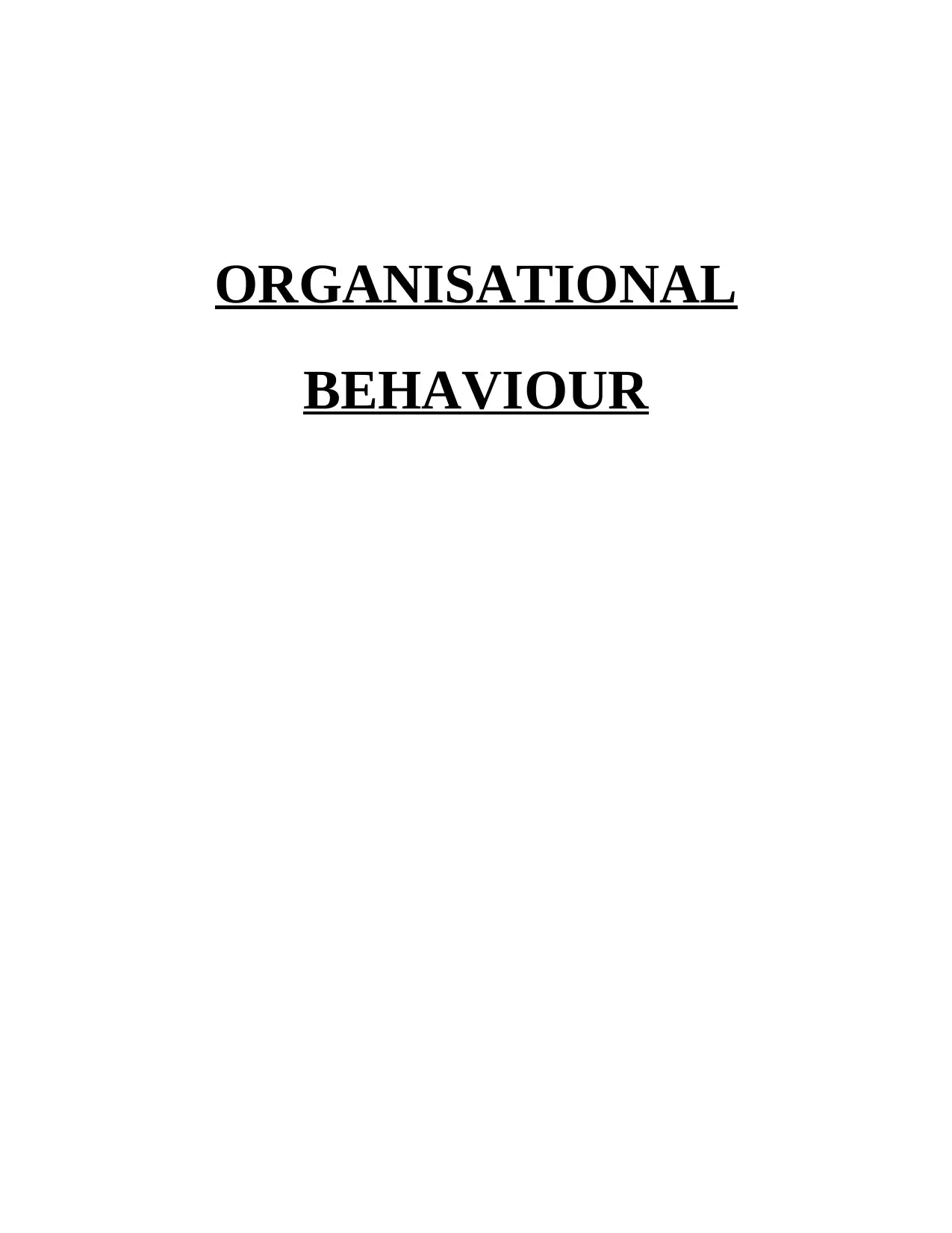
ORGANISATIONAL
BEHAVIOUR
BEHAVIOUR
Paraphrase This Document
Need a fresh take? Get an instant paraphrase of this document with our AI Paraphraser
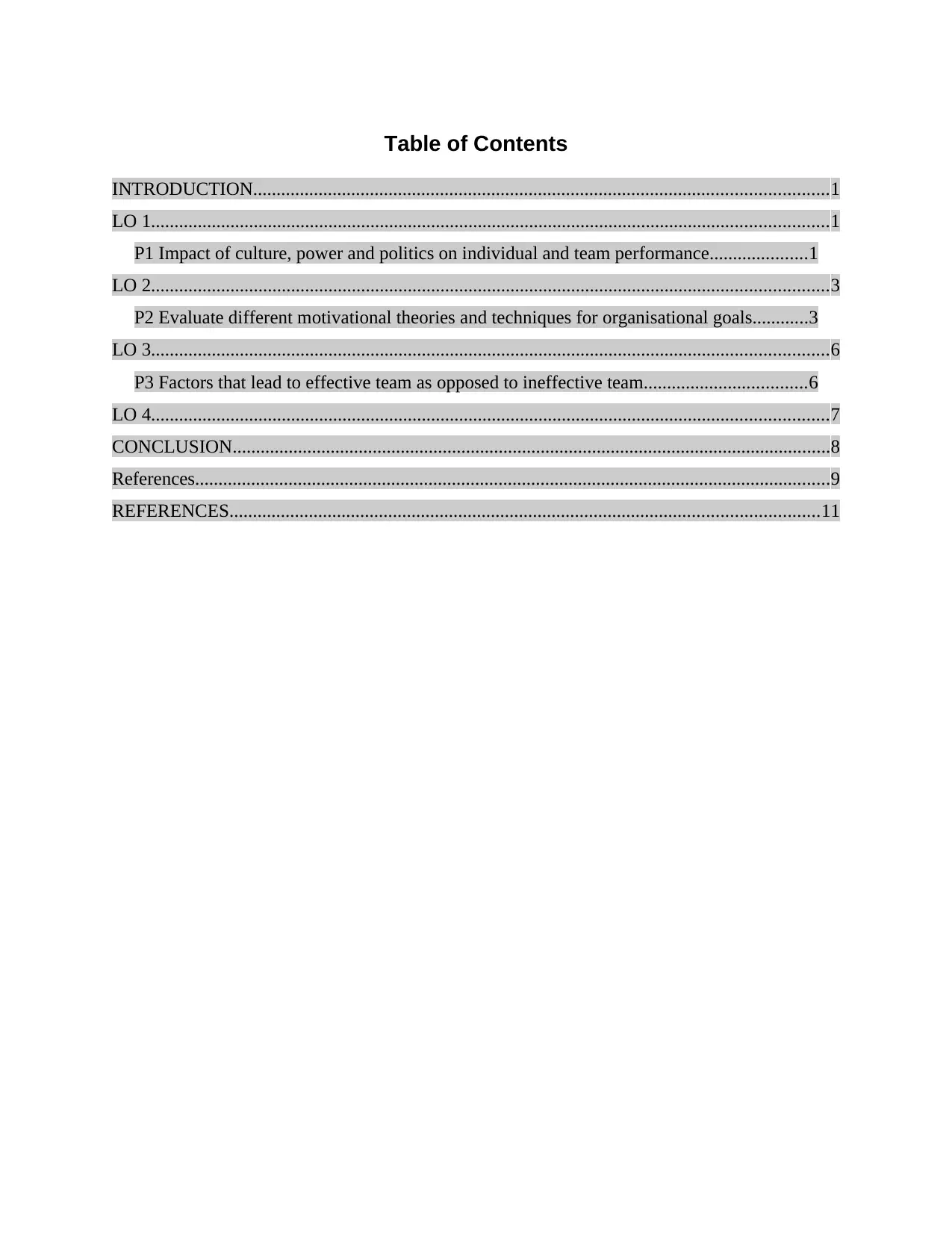
Table of Contents
INTRODUCTION...........................................................................................................................1
LO 1.................................................................................................................................................1
P1 Impact of culture, power and politics on individual and team performance.....................1
LO 2.................................................................................................................................................3
P2 Evaluate different motivational theories and techniques for organisational goals............3
LO 3.................................................................................................................................................6
P3 Factors that lead to effective team as opposed to ineffective team...................................6
LO 4.................................................................................................................................................7
CONCLUSION................................................................................................................................8
References........................................................................................................................................9
REFERENCES..............................................................................................................................11
INTRODUCTION...........................................................................................................................1
LO 1.................................................................................................................................................1
P1 Impact of culture, power and politics on individual and team performance.....................1
LO 2.................................................................................................................................................3
P2 Evaluate different motivational theories and techniques for organisational goals............3
LO 3.................................................................................................................................................6
P3 Factors that lead to effective team as opposed to ineffective team...................................6
LO 4.................................................................................................................................................7
CONCLUSION................................................................................................................................8
References........................................................................................................................................9
REFERENCES..............................................................................................................................11
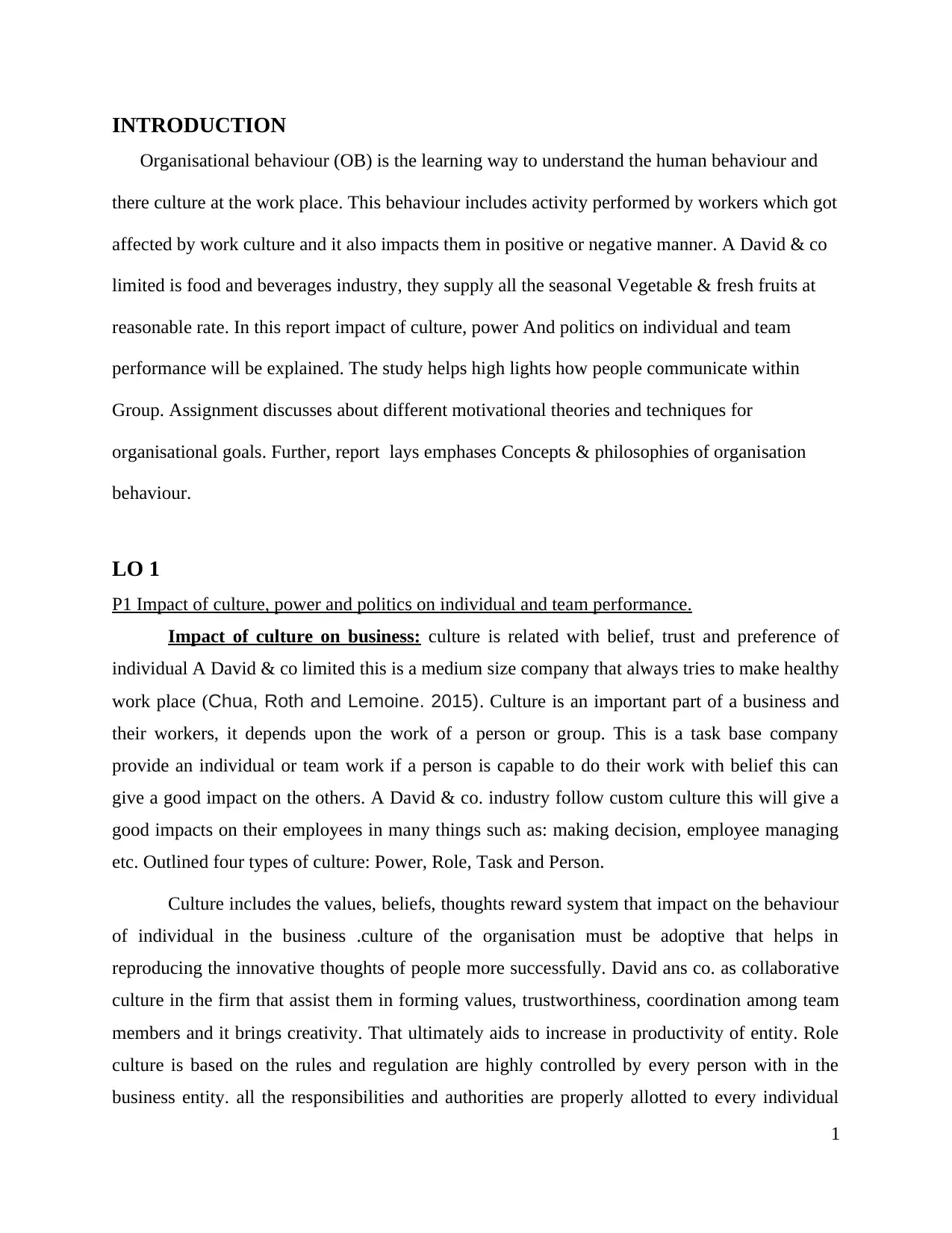
INTRODUCTION
Organisational behaviour (OB) is the learning way to understand the human behaviour and
there culture at the work place. This behaviour includes activity performed by workers which got
affected by work culture and it also impacts them in positive or negative manner. A David & co
limited is food and beverages industry, they supply all the seasonal Vegetable & fresh fruits at
reasonable rate. In this report impact of culture, power And politics on individual and team
performance will be explained. The study helps high lights how people communicate within
Group. Assignment discusses about different motivational theories and techniques for
organisational goals. Further, report lays emphases Concepts & philosophies of organisation
behaviour.
LO 1
P1 Impact of culture, power and politics on individual and team performance.
Impact of culture on business: culture is related with belief, trust and preference of
individual A David & co limited this is a medium size company that always tries to make healthy
work place (Chua, Roth and Lemoine. 2015). Culture is an important part of a business and
their workers, it depends upon the work of a person or group. This is a task base company
provide an individual or team work if a person is capable to do their work with belief this can
give a good impact on the others. A David & co. industry follow custom culture this will give a
good impacts on their employees in many things such as: making decision, employee managing
etc. Outlined four types of culture: Power, Role, Task and Person.
Culture includes the values, beliefs, thoughts reward system that impact on the behaviour
of individual in the business .culture of the organisation must be adoptive that helps in
reproducing the innovative thoughts of people more successfully. David ans co. as collaborative
culture in the firm that assist them in forming values, trustworthiness, coordination among team
members and it brings creativity. That ultimately aids to increase in productivity of entity. Role
culture is based on the rules and regulation are highly controlled by every person with in the
business entity. all the responsibilities and authorities are properly allotted to every individual
1
Organisational behaviour (OB) is the learning way to understand the human behaviour and
there culture at the work place. This behaviour includes activity performed by workers which got
affected by work culture and it also impacts them in positive or negative manner. A David & co
limited is food and beverages industry, they supply all the seasonal Vegetable & fresh fruits at
reasonable rate. In this report impact of culture, power And politics on individual and team
performance will be explained. The study helps high lights how people communicate within
Group. Assignment discusses about different motivational theories and techniques for
organisational goals. Further, report lays emphases Concepts & philosophies of organisation
behaviour.
LO 1
P1 Impact of culture, power and politics on individual and team performance.
Impact of culture on business: culture is related with belief, trust and preference of
individual A David & co limited this is a medium size company that always tries to make healthy
work place (Chua, Roth and Lemoine. 2015). Culture is an important part of a business and
their workers, it depends upon the work of a person or group. This is a task base company
provide an individual or team work if a person is capable to do their work with belief this can
give a good impact on the others. A David & co. industry follow custom culture this will give a
good impacts on their employees in many things such as: making decision, employee managing
etc. Outlined four types of culture: Power, Role, Task and Person.
Culture includes the values, beliefs, thoughts reward system that impact on the behaviour
of individual in the business .culture of the organisation must be adoptive that helps in
reproducing the innovative thoughts of people more successfully. David ans co. as collaborative
culture in the firm that assist them in forming values, trustworthiness, coordination among team
members and it brings creativity. That ultimately aids to increase in productivity of entity. Role
culture is based on the rules and regulation are highly controlled by every person with in the
business entity. all the responsibilities and authorities are properly allotted to every individual
1
⊘ This is a preview!⊘
Do you want full access?
Subscribe today to unlock all pages.

Trusted by 1+ million students worldwide
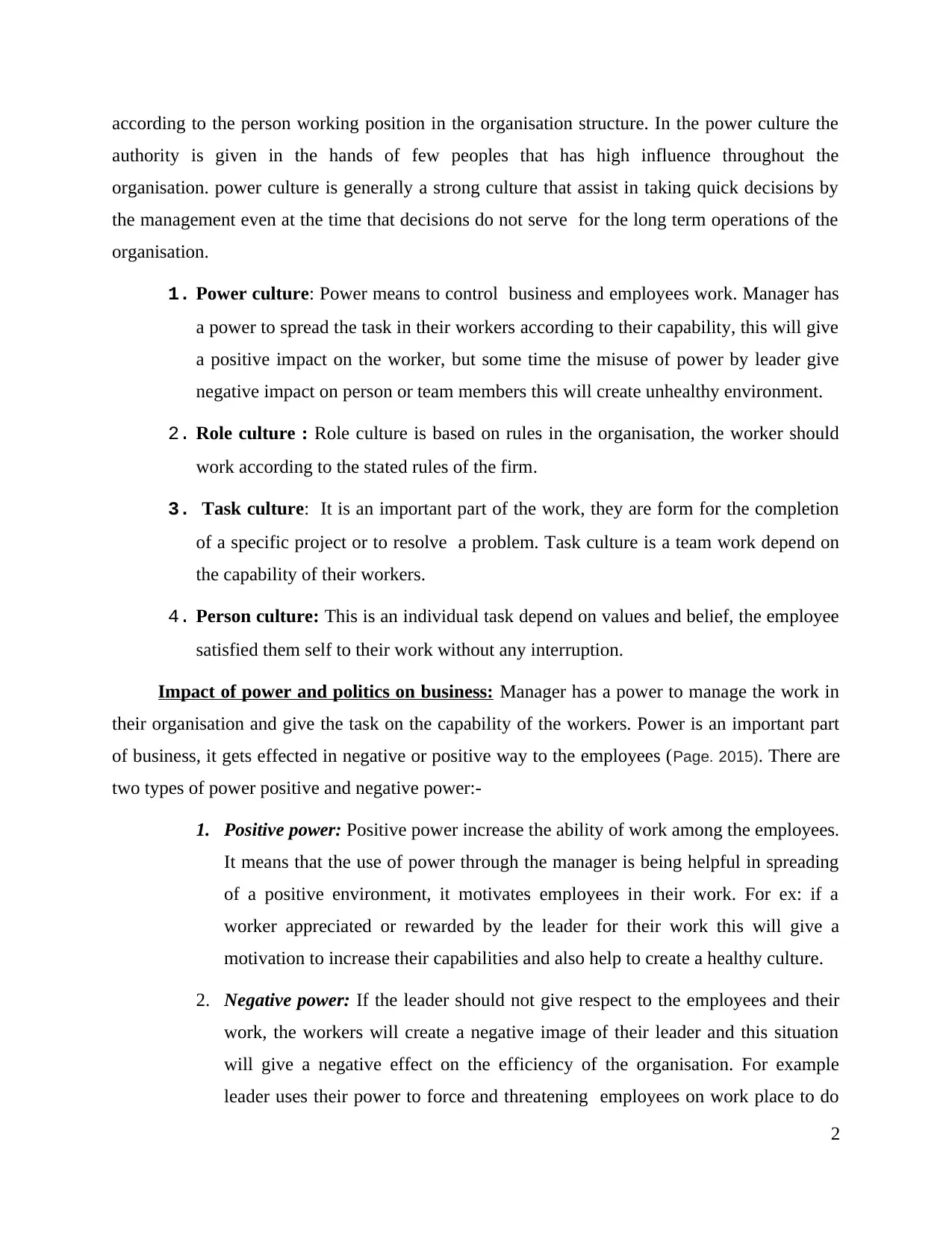
according to the person working position in the organisation structure. In the power culture the
authority is given in the hands of few peoples that has high influence throughout the
organisation. power culture is generally a strong culture that assist in taking quick decisions by
the management even at the time that decisions do not serve for the long term operations of the
organisation.
1. Power culture: Power means to control business and employees work. Manager has
a power to spread the task in their workers according to their capability, this will give
a positive impact on the worker, but some time the misuse of power by leader give
negative impact on person or team members this will create unhealthy environment.
2. Role culture : Role culture is based on rules in the organisation, the worker should
work according to the stated rules of the firm.
3. Task culture: It is an important part of the work, they are form for the completion
of a specific project or to resolve a problem. Task culture is a team work depend on
the capability of their workers.
4. Person culture: This is an individual task depend on values and belief, the employee
satisfied them self to their work without any interruption.
Impact of power and politics on business: Manager has a power to manage the work in
their organisation and give the task on the capability of the workers. Power is an important part
of business, it gets effected in negative or positive way to the employees (Page. 2015). There are
two types of power positive and negative power:-
1. Positive power: Positive power increase the ability of work among the employees.
It means that the use of power through the manager is being helpful in spreading
of a positive environment, it motivates employees in their work. For ex: if a
worker appreciated or rewarded by the leader for their work this will give a
motivation to increase their capabilities and also help to create a healthy culture.
2. Negative power: If the leader should not give respect to the employees and their
work, the workers will create a negative image of their leader and this situation
will give a negative effect on the efficiency of the organisation. For example
leader uses their power to force and threatening employees on work place to do
2
authority is given in the hands of few peoples that has high influence throughout the
organisation. power culture is generally a strong culture that assist in taking quick decisions by
the management even at the time that decisions do not serve for the long term operations of the
organisation.
1. Power culture: Power means to control business and employees work. Manager has
a power to spread the task in their workers according to their capability, this will give
a positive impact on the worker, but some time the misuse of power by leader give
negative impact on person or team members this will create unhealthy environment.
2. Role culture : Role culture is based on rules in the organisation, the worker should
work according to the stated rules of the firm.
3. Task culture: It is an important part of the work, they are form for the completion
of a specific project or to resolve a problem. Task culture is a team work depend on
the capability of their workers.
4. Person culture: This is an individual task depend on values and belief, the employee
satisfied them self to their work without any interruption.
Impact of power and politics on business: Manager has a power to manage the work in
their organisation and give the task on the capability of the workers. Power is an important part
of business, it gets effected in negative or positive way to the employees (Page. 2015). There are
two types of power positive and negative power:-
1. Positive power: Positive power increase the ability of work among the employees.
It means that the use of power through the manager is being helpful in spreading
of a positive environment, it motivates employees in their work. For ex: if a
worker appreciated or rewarded by the leader for their work this will give a
motivation to increase their capabilities and also help to create a healthy culture.
2. Negative power: If the leader should not give respect to the employees and their
work, the workers will create a negative image of their leader and this situation
will give a negative effect on the efficiency of the organisation. For example
leader uses their power to force and threatening employees on work place to do
2
Paraphrase This Document
Need a fresh take? Get an instant paraphrase of this document with our AI Paraphraser
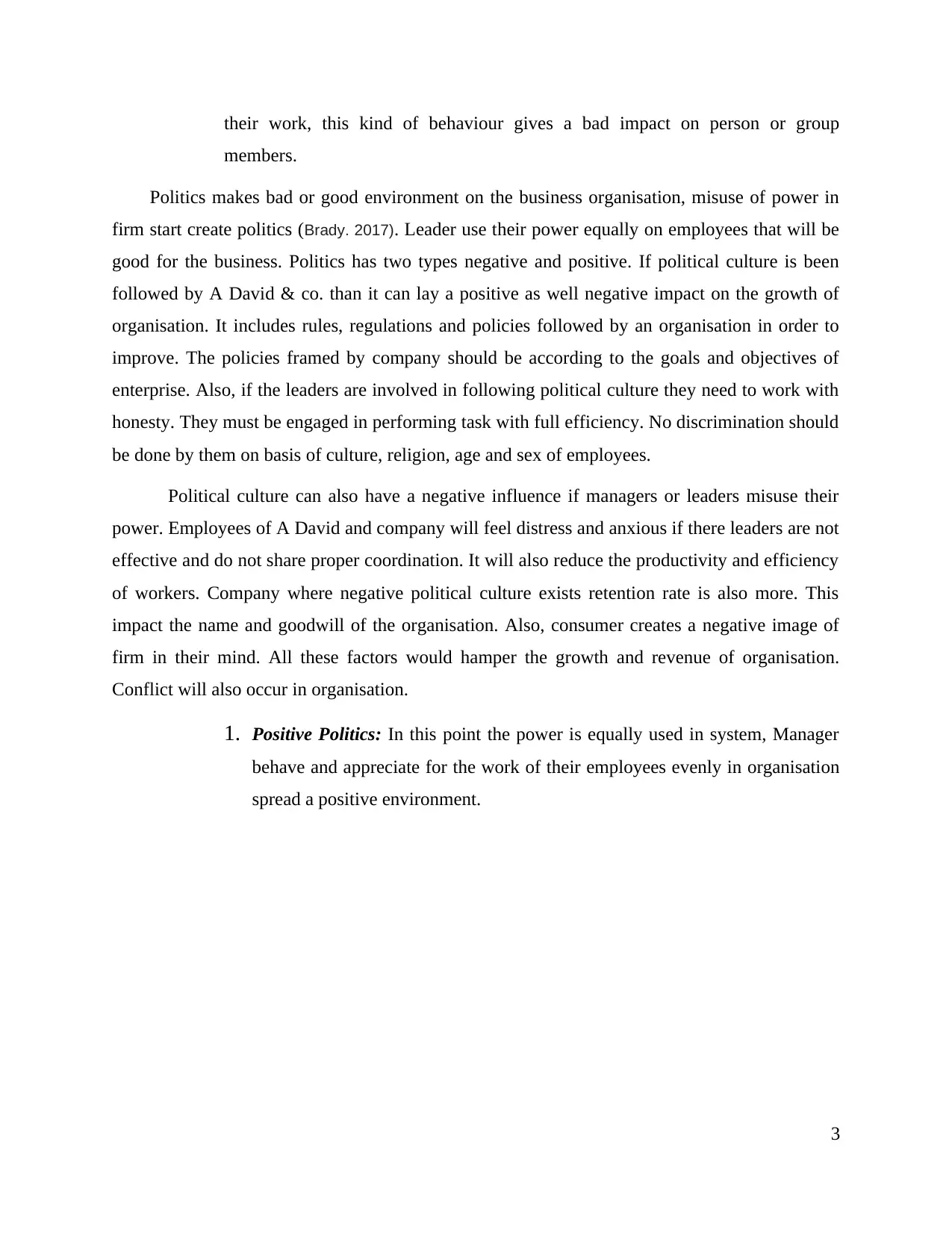
their work, this kind of behaviour gives a bad impact on person or group
members.
Politics makes bad or good environment on the business organisation, misuse of power in
firm start create politics (Brady. 2017). Leader use their power equally on employees that will be
good for the business. Politics has two types negative and positive. If political culture is been
followed by A David & co. than it can lay a positive as well negative impact on the growth of
organisation. It includes rules, regulations and policies followed by an organisation in order to
improve. The policies framed by company should be according to the goals and objectives of
enterprise. Also, if the leaders are involved in following political culture they need to work with
honesty. They must be engaged in performing task with full efficiency. No discrimination should
be done by them on basis of culture, religion, age and sex of employees.
Political culture can also have a negative influence if managers or leaders misuse their
power. Employees of A David and company will feel distress and anxious if there leaders are not
effective and do not share proper coordination. It will also reduce the productivity and efficiency
of workers. Company where negative political culture exists retention rate is also more. This
impact the name and goodwill of the organisation. Also, consumer creates a negative image of
firm in their mind. All these factors would hamper the growth and revenue of organisation.
Conflict will also occur in organisation.
1. Positive Politics: In this point the power is equally used in system, Manager
behave and appreciate for the work of their employees evenly in organisation
spread a positive environment.
3
members.
Politics makes bad or good environment on the business organisation, misuse of power in
firm start create politics (Brady. 2017). Leader use their power equally on employees that will be
good for the business. Politics has two types negative and positive. If political culture is been
followed by A David & co. than it can lay a positive as well negative impact on the growth of
organisation. It includes rules, regulations and policies followed by an organisation in order to
improve. The policies framed by company should be according to the goals and objectives of
enterprise. Also, if the leaders are involved in following political culture they need to work with
honesty. They must be engaged in performing task with full efficiency. No discrimination should
be done by them on basis of culture, religion, age and sex of employees.
Political culture can also have a negative influence if managers or leaders misuse their
power. Employees of A David and company will feel distress and anxious if there leaders are not
effective and do not share proper coordination. It will also reduce the productivity and efficiency
of workers. Company where negative political culture exists retention rate is also more. This
impact the name and goodwill of the organisation. Also, consumer creates a negative image of
firm in their mind. All these factors would hamper the growth and revenue of organisation.
Conflict will also occur in organisation.
1. Positive Politics: In this point the power is equally used in system, Manager
behave and appreciate for the work of their employees evenly in organisation
spread a positive environment.
3
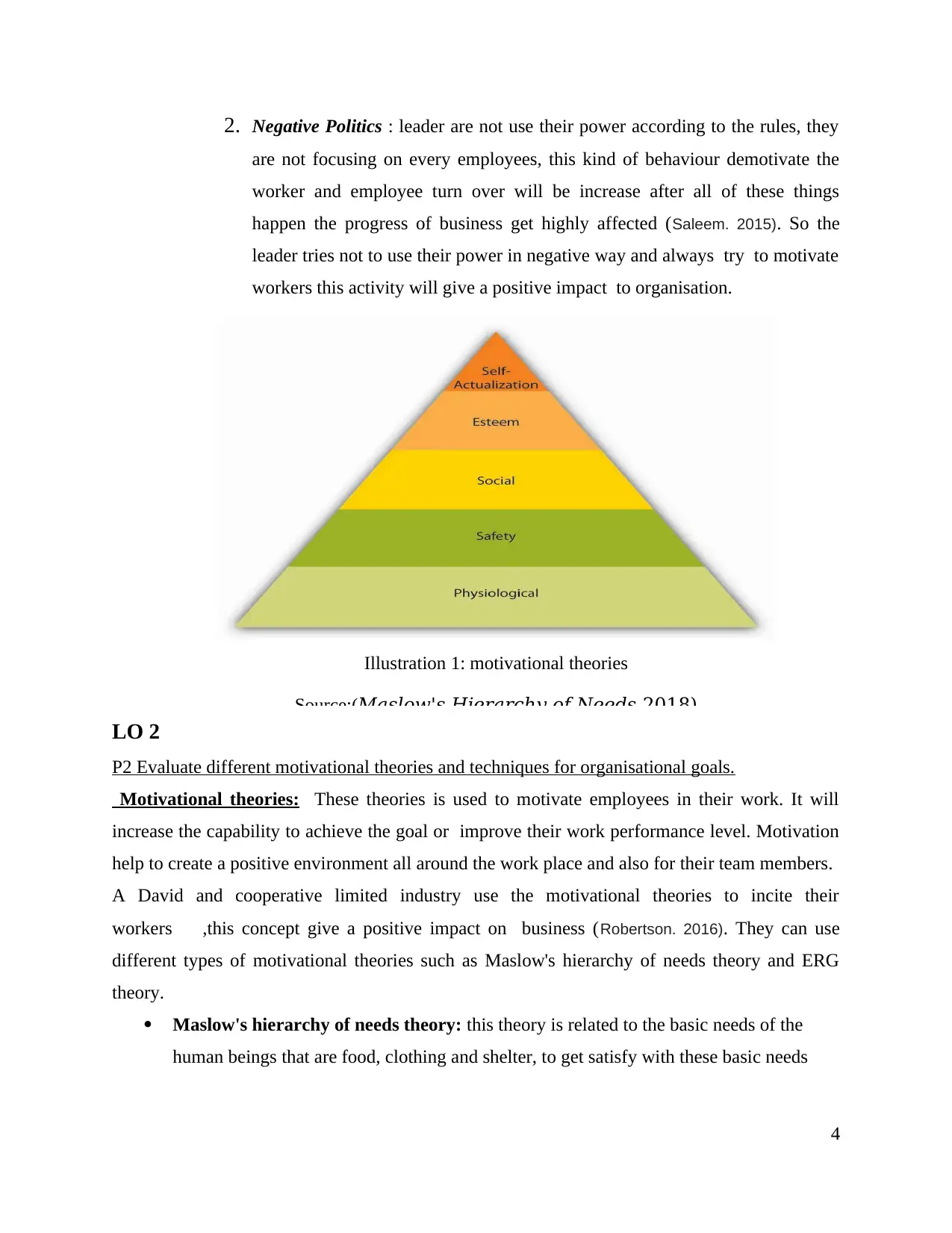
2. Negative Politics : leader are not use their power according to the rules, they
are not focusing on every employees, this kind of behaviour demotivate the
worker and employee turn over will be increase after all of these things
happen the progress of business get highly affected (Saleem. 2015). So the
leader tries not to use their power in negative way and always try to motivate
workers this activity will give a positive impact to organisation.
LO 2
P2 Evaluate different motivational theories and techniques for organisational goals.
Motivational theories: These theories is used to motivate employees in their work. It will
increase the capability to achieve the goal or improve their work performance level. Motivation
help to create a positive environment all around the work place and also for their team members.
A David and cooperative limited industry use the motivational theories to incite their
workers ,this concept give a positive impact on business (Robertson. 2016). They can use
different types of motivational theories such as Maslow's hierarchy of needs theory and ERG
theory.
Maslow's hierarchy of needs theory: this theory is related to the basic needs of the
human beings that are food, clothing and shelter, to get satisfy with these basic needs
4
Illustration 1: motivational theories
Source:(Maslow's Hierarchy of Needs.2018)
are not focusing on every employees, this kind of behaviour demotivate the
worker and employee turn over will be increase after all of these things
happen the progress of business get highly affected (Saleem. 2015). So the
leader tries not to use their power in negative way and always try to motivate
workers this activity will give a positive impact to organisation.
LO 2
P2 Evaluate different motivational theories and techniques for organisational goals.
Motivational theories: These theories is used to motivate employees in their work. It will
increase the capability to achieve the goal or improve their work performance level. Motivation
help to create a positive environment all around the work place and also for their team members.
A David and cooperative limited industry use the motivational theories to incite their
workers ,this concept give a positive impact on business (Robertson. 2016). They can use
different types of motivational theories such as Maslow's hierarchy of needs theory and ERG
theory.
Maslow's hierarchy of needs theory: this theory is related to the basic needs of the
human beings that are food, clothing and shelter, to get satisfy with these basic needs
4
Illustration 1: motivational theories
Source:(Maslow's Hierarchy of Needs.2018)
⊘ This is a preview!⊘
Do you want full access?
Subscribe today to unlock all pages.

Trusted by 1+ million students worldwide
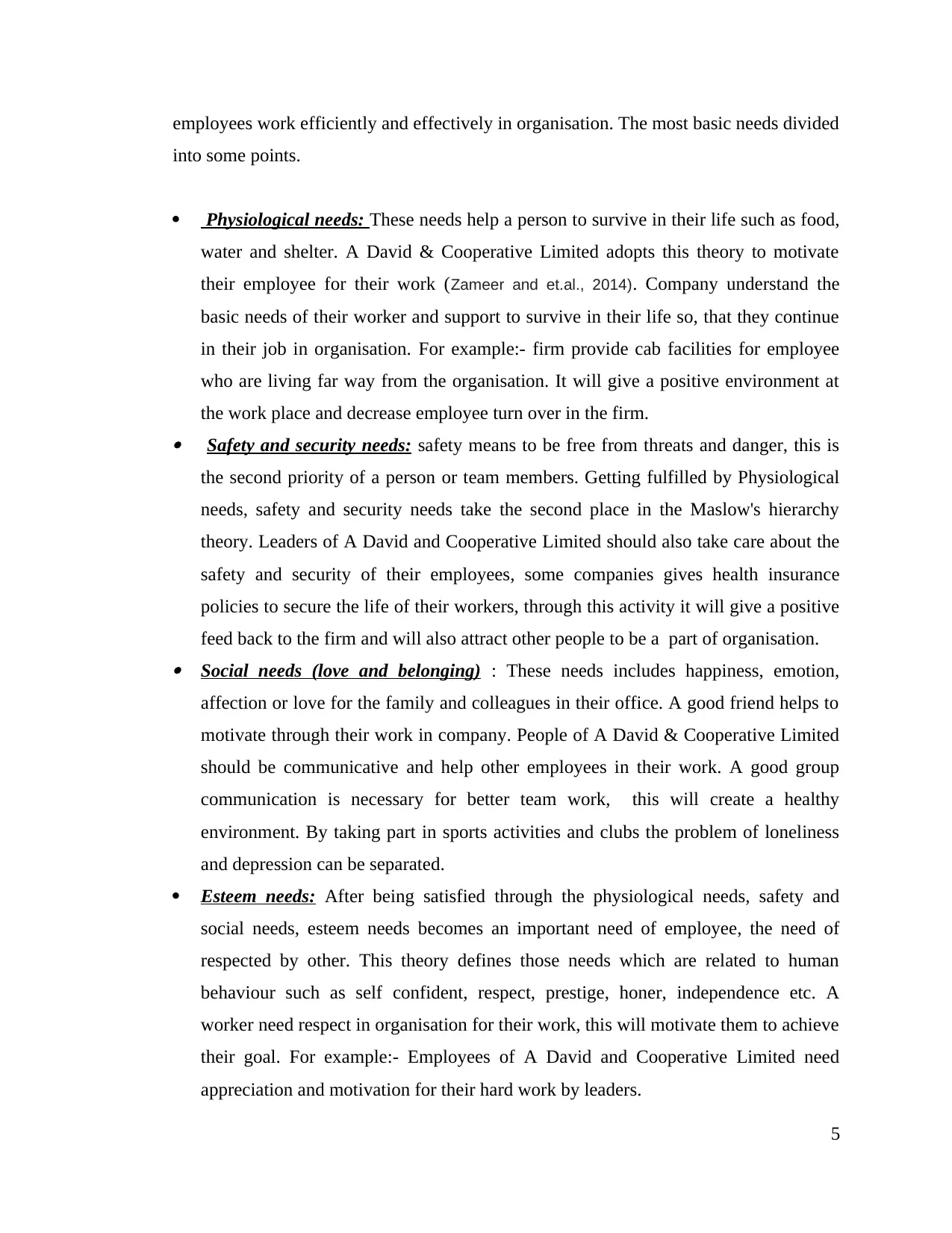
employees work efficiently and effectively in organisation. The most basic needs divided
into some points.
Physiological needs: These needs help a person to survive in their life such as food,
water and shelter. A David & Cooperative Limited adopts this theory to motivate
their employee for their work (Zameer and et.al., 2014). Company understand the
basic needs of their worker and support to survive in their life so, that they continue
in their job in organisation. For example:- firm provide cab facilities for employee
who are living far way from the organisation. It will give a positive environment at
the work place and decrease employee turn over in the firm.
Safety and security needs: safety means to be free from threats and danger, this is
the second priority of a person or team members. Getting fulfilled by Physiological
needs, safety and security needs take the second place in the Maslow's hierarchy
theory. Leaders of A David and Cooperative Limited should also take care about the
safety and security of their employees, some companies gives health insurance
policies to secure the life of their workers, through this activity it will give a positive
feed back to the firm and will also attract other people to be a part of organisation.
Social needs (love and belonging) : These needs includes happiness, emotion,
affection or love for the family and colleagues in their office. A good friend helps to
motivate through their work in company. People of A David & Cooperative Limited
should be communicative and help other employees in their work. A good group
communication is necessary for better team work, this will create a healthy
environment. By taking part in sports activities and clubs the problem of loneliness
and depression can be separated.
Esteem needs: After being satisfied through the physiological needs, safety and
social needs, esteem needs becomes an important need of employee, the need of
respected by other. This theory defines those needs which are related to human
behaviour such as self confident, respect, prestige, honer, independence etc. A
worker need respect in organisation for their work, this will motivate them to achieve
their goal. For example:- Employees of A David and Cooperative Limited need
appreciation and motivation for their hard work by leaders.
5
into some points.
Physiological needs: These needs help a person to survive in their life such as food,
water and shelter. A David & Cooperative Limited adopts this theory to motivate
their employee for their work (Zameer and et.al., 2014). Company understand the
basic needs of their worker and support to survive in their life so, that they continue
in their job in organisation. For example:- firm provide cab facilities for employee
who are living far way from the organisation. It will give a positive environment at
the work place and decrease employee turn over in the firm.
Safety and security needs: safety means to be free from threats and danger, this is
the second priority of a person or team members. Getting fulfilled by Physiological
needs, safety and security needs take the second place in the Maslow's hierarchy
theory. Leaders of A David and Cooperative Limited should also take care about the
safety and security of their employees, some companies gives health insurance
policies to secure the life of their workers, through this activity it will give a positive
feed back to the firm and will also attract other people to be a part of organisation.
Social needs (love and belonging) : These needs includes happiness, emotion,
affection or love for the family and colleagues in their office. A good friend helps to
motivate through their work in company. People of A David & Cooperative Limited
should be communicative and help other employees in their work. A good group
communication is necessary for better team work, this will create a healthy
environment. By taking part in sports activities and clubs the problem of loneliness
and depression can be separated.
Esteem needs: After being satisfied through the physiological needs, safety and
social needs, esteem needs becomes an important need of employee, the need of
respected by other. This theory defines those needs which are related to human
behaviour such as self confident, respect, prestige, honer, independence etc. A
worker need respect in organisation for their work, this will motivate them to achieve
their goal. For example:- Employees of A David and Cooperative Limited need
appreciation and motivation for their hard work by leaders.
5
Paraphrase This Document
Need a fresh take? Get an instant paraphrase of this document with our AI Paraphraser
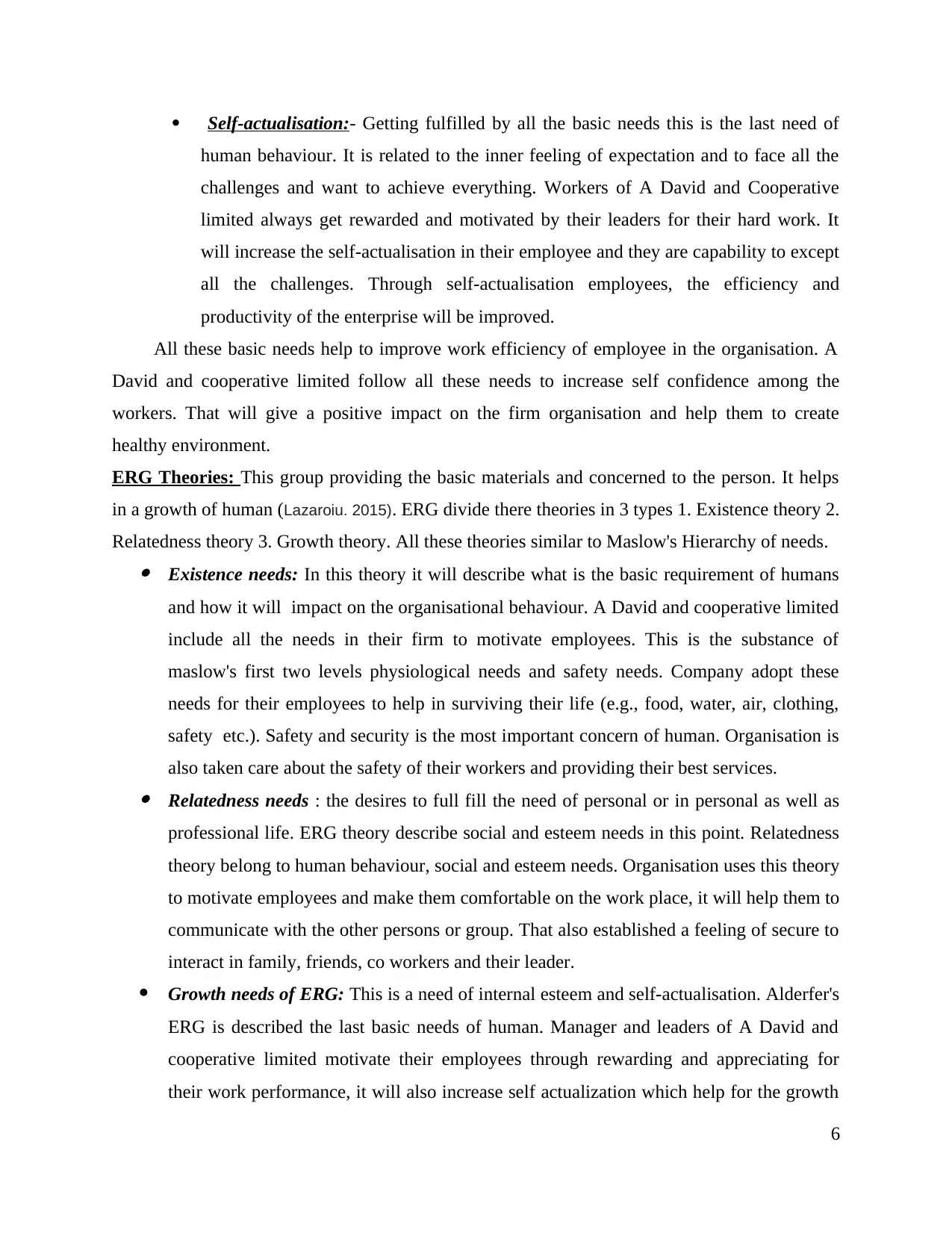
Self-actualisation:- Getting fulfilled by all the basic needs this is the last need of
human behaviour. It is related to the inner feeling of expectation and to face all the
challenges and want to achieve everything. Workers of A David and Cooperative
limited always get rewarded and motivated by their leaders for their hard work. It
will increase the self-actualisation in their employee and they are capability to except
all the challenges. Through self-actualisation employees, the efficiency and
productivity of the enterprise will be improved.
All these basic needs help to improve work efficiency of employee in the organisation. A
David and cooperative limited follow all these needs to increase self confidence among the
workers. That will give a positive impact on the firm organisation and help them to create
healthy environment.
ERG Theories: This group providing the basic materials and concerned to the person. It helps
in a growth of human (Lazaroiu. 2015). ERG divide there theories in 3 types 1. Existence theory 2.
Relatedness theory 3. Growth theory. All these theories similar to Maslow's Hierarchy of needs. Existence needs: In this theory it will describe what is the basic requirement of humans
and how it will impact on the organisational behaviour. A David and cooperative limited
include all the needs in their firm to motivate employees. This is the substance of
maslow's first two levels physiological needs and safety needs. Company adopt these
needs for their employees to help in surviving their life (e.g., food, water, air, clothing,
safety etc.). Safety and security is the most important concern of human. Organisation is
also taken care about the safety of their workers and providing their best services. Relatedness needs : the desires to full fill the need of personal or in personal as well as
professional life. ERG theory describe social and esteem needs in this point. Relatedness
theory belong to human behaviour, social and esteem needs. Organisation uses this theory
to motivate employees and make them comfortable on the work place, it will help them to
communicate with the other persons or group. That also established a feeling of secure to
interact in family, friends, co workers and their leader.
Growth needs of ERG: This is a need of internal esteem and self-actualisation. Alderfer's
ERG is described the last basic needs of human. Manager and leaders of A David and
cooperative limited motivate their employees through rewarding and appreciating for
their work performance, it will also increase self actualization which help for the growth
6
human behaviour. It is related to the inner feeling of expectation and to face all the
challenges and want to achieve everything. Workers of A David and Cooperative
limited always get rewarded and motivated by their leaders for their hard work. It
will increase the self-actualisation in their employee and they are capability to except
all the challenges. Through self-actualisation employees, the efficiency and
productivity of the enterprise will be improved.
All these basic needs help to improve work efficiency of employee in the organisation. A
David and cooperative limited follow all these needs to increase self confidence among the
workers. That will give a positive impact on the firm organisation and help them to create
healthy environment.
ERG Theories: This group providing the basic materials and concerned to the person. It helps
in a growth of human (Lazaroiu. 2015). ERG divide there theories in 3 types 1. Existence theory 2.
Relatedness theory 3. Growth theory. All these theories similar to Maslow's Hierarchy of needs. Existence needs: In this theory it will describe what is the basic requirement of humans
and how it will impact on the organisational behaviour. A David and cooperative limited
include all the needs in their firm to motivate employees. This is the substance of
maslow's first two levels physiological needs and safety needs. Company adopt these
needs for their employees to help in surviving their life (e.g., food, water, air, clothing,
safety etc.). Safety and security is the most important concern of human. Organisation is
also taken care about the safety of their workers and providing their best services. Relatedness needs : the desires to full fill the need of personal or in personal as well as
professional life. ERG theory describe social and esteem needs in this point. Relatedness
theory belong to human behaviour, social and esteem needs. Organisation uses this theory
to motivate employees and make them comfortable on the work place, it will help them to
communicate with the other persons or group. That also established a feeling of secure to
interact in family, friends, co workers and their leader.
Growth needs of ERG: This is a need of internal esteem and self-actualisation. Alderfer's
ERG is described the last basic needs of human. Manager and leaders of A David and
cooperative limited motivate their employees through rewarding and appreciating for
their work performance, it will also increase self actualization which help for the growth
6
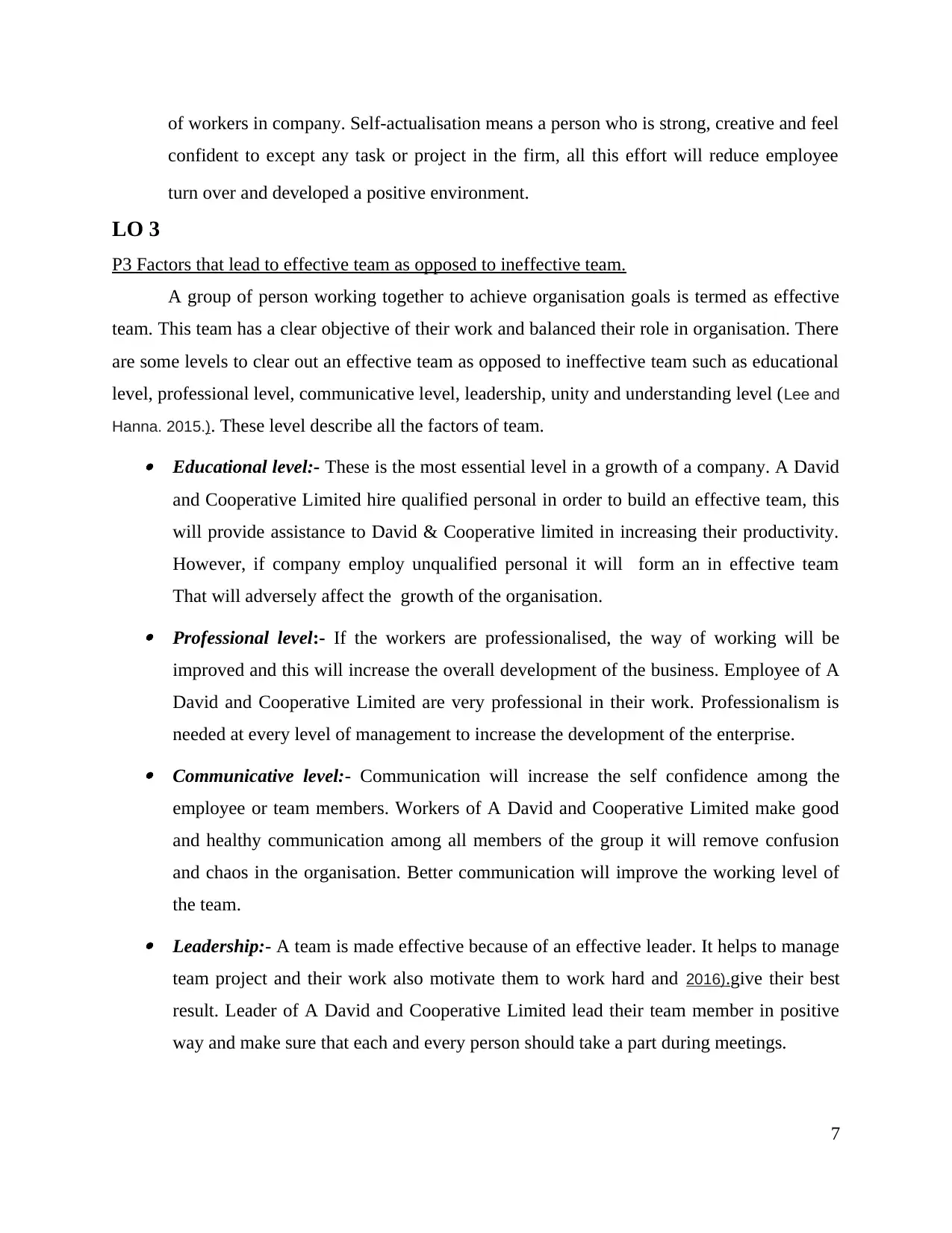
of workers in company. Self-actualisation means a person who is strong, creative and feel
confident to except any task or project in the firm, all this effort will reduce employee
turn over and developed a positive environment.
LO 3
P3 Factors that lead to effective team as opposed to ineffective team.
A group of person working together to achieve organisation goals is termed as effective
team. This team has a clear objective of their work and balanced their role in organisation. There
are some levels to clear out an effective team as opposed to ineffective team such as educational
level, professional level, communicative level, leadership, unity and understanding level (Lee and
Hanna. 2015.). These level describe all the factors of team. Educational level:- These is the most essential level in a growth of a company. A David
and Cooperative Limited hire qualified personal in order to build an effective team, this
will provide assistance to David & Cooperative limited in increasing their productivity.
However, if company employ unqualified personal it will form an in effective team
That will adversely affect the growth of the organisation. Professional level:- If the workers are professionalised, the way of working will be
improved and this will increase the overall development of the business. Employee of A
David and Cooperative Limited are very professional in their work. Professionalism is
needed at every level of management to increase the development of the enterprise. Communicative level:- Communication will increase the self confidence among the
employee or team members. Workers of A David and Cooperative Limited make good
and healthy communication among all members of the group it will remove confusion
and chaos in the organisation. Better communication will improve the working level of
the team. Leadership:- A team is made effective because of an effective leader. It helps to manage
team project and their work also motivate them to work hard and 2016).give their best
result. Leader of A David and Cooperative Limited lead their team member in positive
way and make sure that each and every person should take a part during meetings.
7
confident to except any task or project in the firm, all this effort will reduce employee
turn over and developed a positive environment.
LO 3
P3 Factors that lead to effective team as opposed to ineffective team.
A group of person working together to achieve organisation goals is termed as effective
team. This team has a clear objective of their work and balanced their role in organisation. There
are some levels to clear out an effective team as opposed to ineffective team such as educational
level, professional level, communicative level, leadership, unity and understanding level (Lee and
Hanna. 2015.). These level describe all the factors of team. Educational level:- These is the most essential level in a growth of a company. A David
and Cooperative Limited hire qualified personal in order to build an effective team, this
will provide assistance to David & Cooperative limited in increasing their productivity.
However, if company employ unqualified personal it will form an in effective team
That will adversely affect the growth of the organisation. Professional level:- If the workers are professionalised, the way of working will be
improved and this will increase the overall development of the business. Employee of A
David and Cooperative Limited are very professional in their work. Professionalism is
needed at every level of management to increase the development of the enterprise. Communicative level:- Communication will increase the self confidence among the
employee or team members. Workers of A David and Cooperative Limited make good
and healthy communication among all members of the group it will remove confusion
and chaos in the organisation. Better communication will improve the working level of
the team. Leadership:- A team is made effective because of an effective leader. It helps to manage
team project and their work also motivate them to work hard and 2016).give their best
result. Leader of A David and Cooperative Limited lead their team member in positive
way and make sure that each and every person should take a part during meetings.
7
⊘ This is a preview!⊘
Do you want full access?
Subscribe today to unlock all pages.

Trusted by 1+ million students worldwide
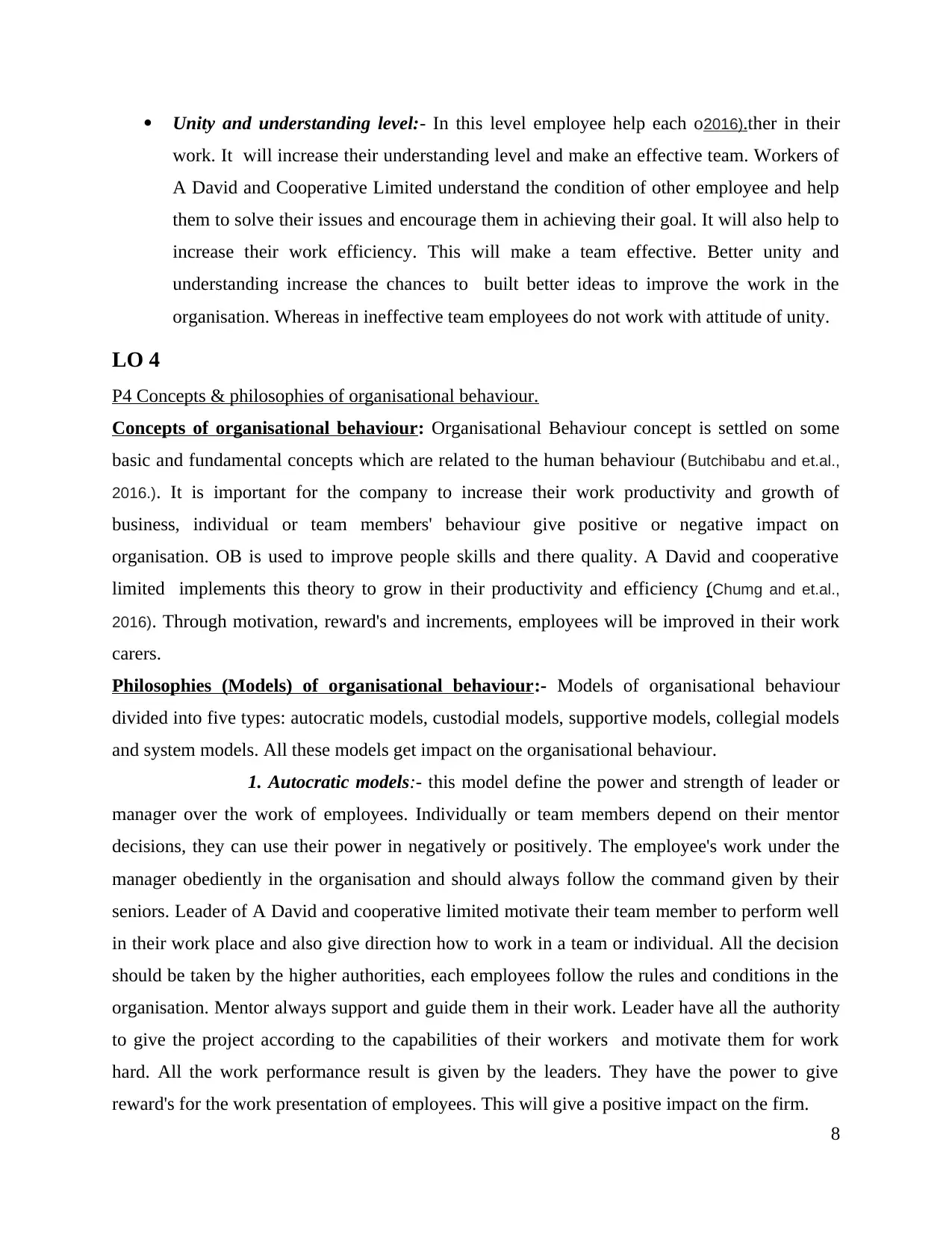
Unity and understanding level:- In this level employee help each o2016).ther in their
work. It will increase their understanding level and make an effective team. Workers of
A David and Cooperative Limited understand the condition of other employee and help
them to solve their issues and encourage them in achieving their goal. It will also help to
increase their work efficiency. This will make a team effective. Better unity and
understanding increase the chances to built better ideas to improve the work in the
organisation. Whereas in ineffective team employees do not work with attitude of unity.
LO 4
P4 Concepts & philosophies of organisational behaviour.
Concepts of organisational behaviour: Organisational Behaviour concept is settled on some
basic and fundamental concepts which are related to the human behaviour (Butchibabu and et.al.,
2016.). It is important for the company to increase their work productivity and growth of
business, individual or team members' behaviour give positive or negative impact on
organisation. OB is used to improve people skills and there quality. A David and cooperative
limited implements this theory to grow in their productivity and efficiency (Chumg and et.al.,
2016). Through motivation, reward's and increments, employees will be improved in their work
carers.
Philosophies (Models) of organisational behaviour:- Models of organisational behaviour
divided into five types: autocratic models, custodial models, supportive models, collegial models
and system models. All these models get impact on the organisational behaviour.
1. Autocratic models:- this model define the power and strength of leader or
manager over the work of employees. Individually or team members depend on their mentor
decisions, they can use their power in negatively or positively. The employee's work under the
manager obediently in the organisation and should always follow the command given by their
seniors. Leader of A David and cooperative limited motivate their team member to perform well
in their work place and also give direction how to work in a team or individual. All the decision
should be taken by the higher authorities, each employees follow the rules and conditions in the
organisation. Mentor always support and guide them in their work. Leader have all the authority
to give the project according to the capabilities of their workers and motivate them for work
hard. All the work performance result is given by the leaders. They have the power to give
reward's for the work presentation of employees. This will give a positive impact on the firm.
8
work. It will increase their understanding level and make an effective team. Workers of
A David and Cooperative Limited understand the condition of other employee and help
them to solve their issues and encourage them in achieving their goal. It will also help to
increase their work efficiency. This will make a team effective. Better unity and
understanding increase the chances to built better ideas to improve the work in the
organisation. Whereas in ineffective team employees do not work with attitude of unity.
LO 4
P4 Concepts & philosophies of organisational behaviour.
Concepts of organisational behaviour: Organisational Behaviour concept is settled on some
basic and fundamental concepts which are related to the human behaviour (Butchibabu and et.al.,
2016.). It is important for the company to increase their work productivity and growth of
business, individual or team members' behaviour give positive or negative impact on
organisation. OB is used to improve people skills and there quality. A David and cooperative
limited implements this theory to grow in their productivity and efficiency (Chumg and et.al.,
2016). Through motivation, reward's and increments, employees will be improved in their work
carers.
Philosophies (Models) of organisational behaviour:- Models of organisational behaviour
divided into five types: autocratic models, custodial models, supportive models, collegial models
and system models. All these models get impact on the organisational behaviour.
1. Autocratic models:- this model define the power and strength of leader or
manager over the work of employees. Individually or team members depend on their mentor
decisions, they can use their power in negatively or positively. The employee's work under the
manager obediently in the organisation and should always follow the command given by their
seniors. Leader of A David and cooperative limited motivate their team member to perform well
in their work place and also give direction how to work in a team or individual. All the decision
should be taken by the higher authorities, each employees follow the rules and conditions in the
organisation. Mentor always support and guide them in their work. Leader have all the authority
to give the project according to the capabilities of their workers and motivate them for work
hard. All the work performance result is given by the leaders. They have the power to give
reward's for the work presentation of employees. This will give a positive impact on the firm.
8
Paraphrase This Document
Need a fresh take? Get an instant paraphrase of this document with our AI Paraphraser
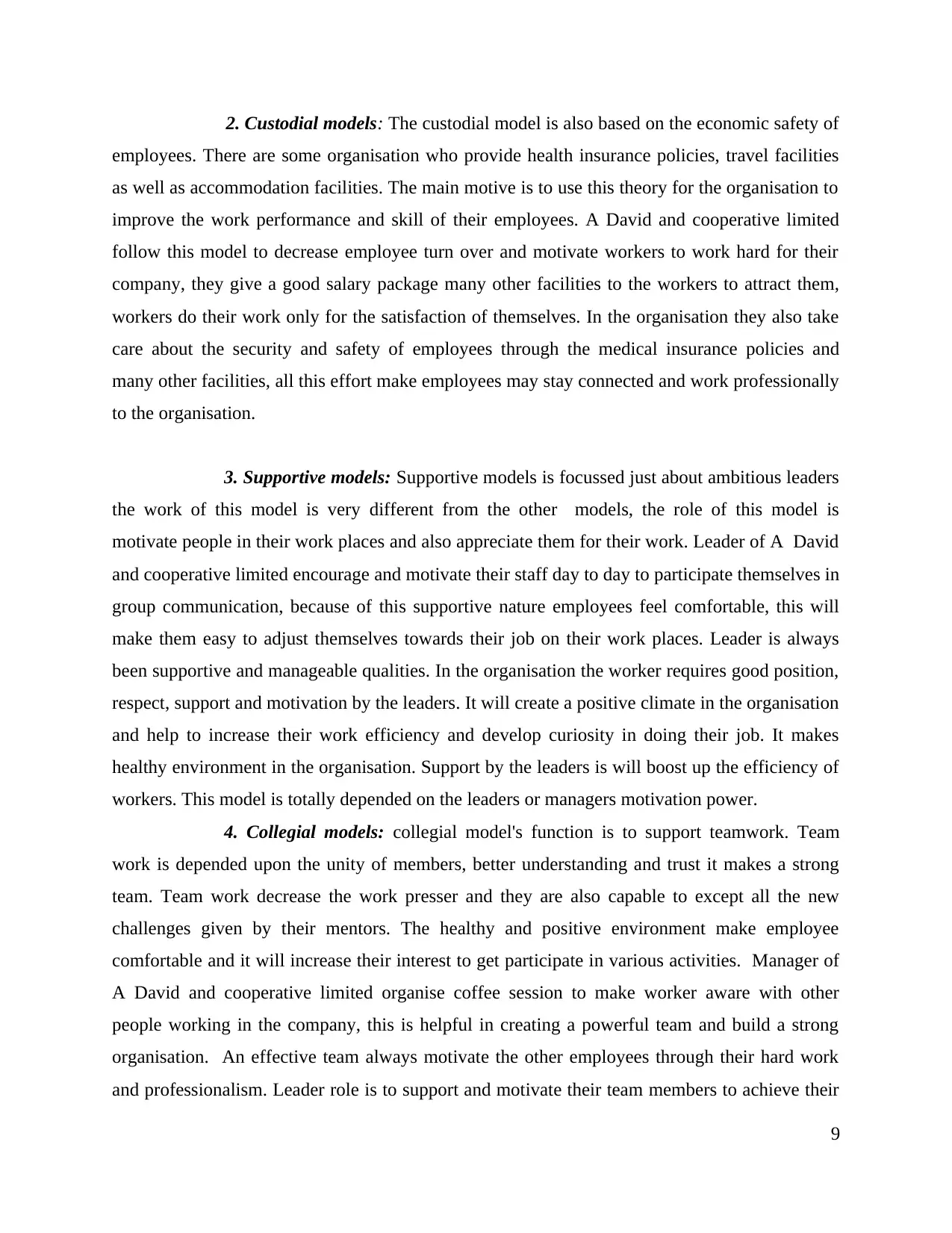
2. Custodial models: The custodial model is also based on the economic safety of
employees. There are some organisation who provide health insurance policies, travel facilities
as well as accommodation facilities. The main motive is to use this theory for the organisation to
improve the work performance and skill of their employees. A David and cooperative limited
follow this model to decrease employee turn over and motivate workers to work hard for their
company, they give a good salary package many other facilities to the workers to attract them,
workers do their work only for the satisfaction of themselves. In the organisation they also take
care about the security and safety of employees through the medical insurance policies and
many other facilities, all this effort make employees may stay connected and work professionally
to the organisation.
3. Supportive models: Supportive models is focussed just about ambitious leaders
the work of this model is very different from the other models, the role of this model is
motivate people in their work places and also appreciate them for their work. Leader of A David
and cooperative limited encourage and motivate their staff day to day to participate themselves in
group communication, because of this supportive nature employees feel comfortable, this will
make them easy to adjust themselves towards their job on their work places. Leader is always
been supportive and manageable qualities. In the organisation the worker requires good position,
respect, support and motivation by the leaders. It will create a positive climate in the organisation
and help to increase their work efficiency and develop curiosity in doing their job. It makes
healthy environment in the organisation. Support by the leaders is will boost up the efficiency of
workers. This model is totally depended on the leaders or managers motivation power.
4. Collegial models: collegial model's function is to support teamwork. Team
work is depended upon the unity of members, better understanding and trust it makes a strong
team. Team work decrease the work presser and they are also capable to except all the new
challenges given by their mentors. The healthy and positive environment make employee
comfortable and it will increase their interest to get participate in various activities. Manager of
A David and cooperative limited organise coffee session to make worker aware with other
people working in the company, this is helpful in creating a powerful team and build a strong
organisation. An effective team always motivate the other employees through their hard work
and professionalism. Leader role is to support and motivate their team members to achieve their
9
employees. There are some organisation who provide health insurance policies, travel facilities
as well as accommodation facilities. The main motive is to use this theory for the organisation to
improve the work performance and skill of their employees. A David and cooperative limited
follow this model to decrease employee turn over and motivate workers to work hard for their
company, they give a good salary package many other facilities to the workers to attract them,
workers do their work only for the satisfaction of themselves. In the organisation they also take
care about the security and safety of employees through the medical insurance policies and
many other facilities, all this effort make employees may stay connected and work professionally
to the organisation.
3. Supportive models: Supportive models is focussed just about ambitious leaders
the work of this model is very different from the other models, the role of this model is
motivate people in their work places and also appreciate them for their work. Leader of A David
and cooperative limited encourage and motivate their staff day to day to participate themselves in
group communication, because of this supportive nature employees feel comfortable, this will
make them easy to adjust themselves towards their job on their work places. Leader is always
been supportive and manageable qualities. In the organisation the worker requires good position,
respect, support and motivation by the leaders. It will create a positive climate in the organisation
and help to increase their work efficiency and develop curiosity in doing their job. It makes
healthy environment in the organisation. Support by the leaders is will boost up the efficiency of
workers. This model is totally depended on the leaders or managers motivation power.
4. Collegial models: collegial model's function is to support teamwork. Team
work is depended upon the unity of members, better understanding and trust it makes a strong
team. Team work decrease the work presser and they are also capable to except all the new
challenges given by their mentors. The healthy and positive environment make employee
comfortable and it will increase their interest to get participate in various activities. Manager of
A David and cooperative limited organise coffee session to make worker aware with other
people working in the company, this is helpful in creating a powerful team and build a strong
organisation. An effective team always motivate the other employees through their hard work
and professionalism. Leader role is to support and motivate their team members to achieve their
9
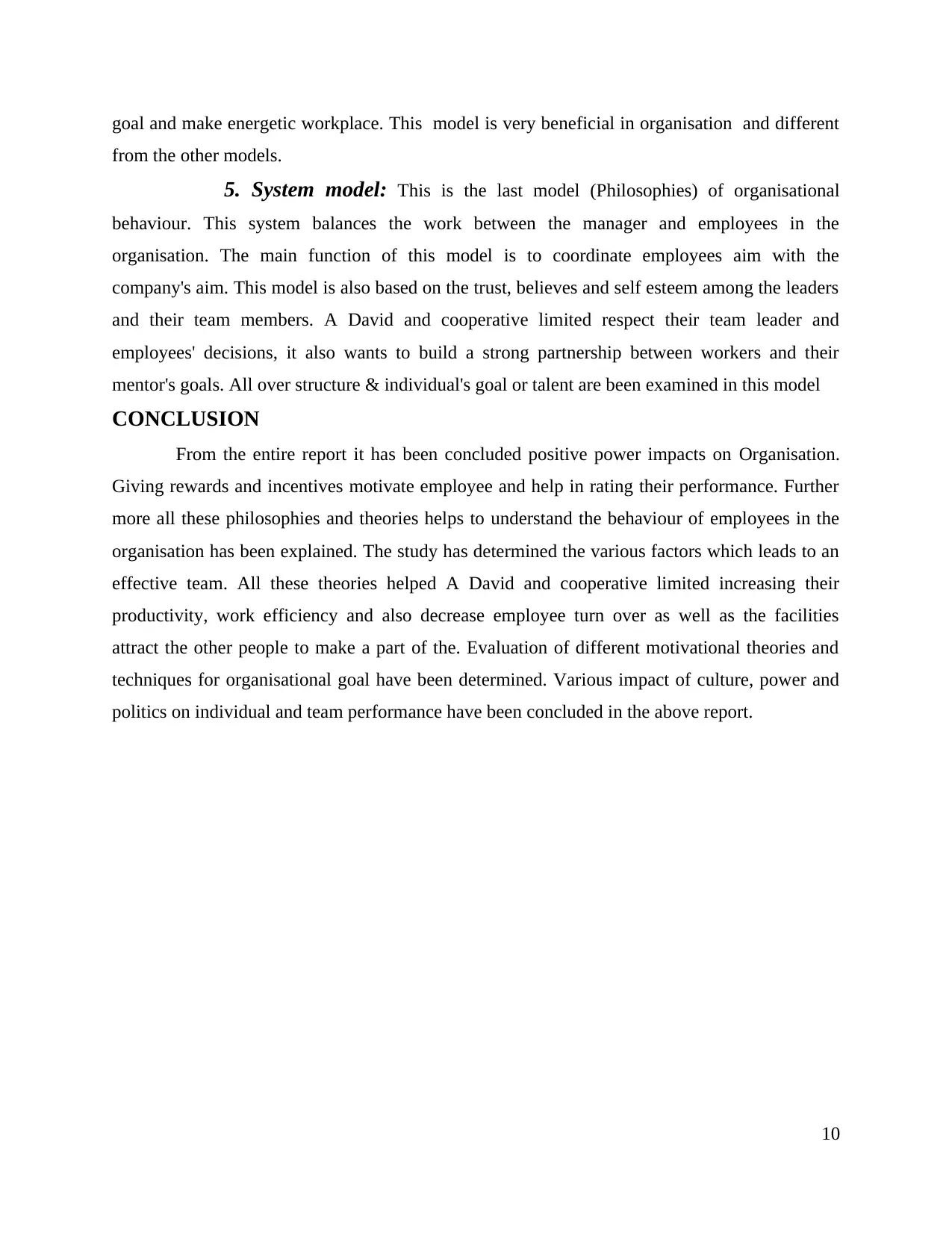
goal and make energetic workplace. This model is very beneficial in organisation and different
from the other models.
5. System model: This is the last model (Philosophies) of organisational
behaviour. This system balances the work between the manager and employees in the
organisation. The main function of this model is to coordinate employees aim with the
company's aim. This model is also based on the trust, believes and self esteem among the leaders
and their team members. A David and cooperative limited respect their team leader and
employees' decisions, it also wants to build a strong partnership between workers and their
mentor's goals. All over structure & individual's goal or talent are been examined in this model
CONCLUSION
From the entire report it has been concluded positive power impacts on Organisation.
Giving rewards and incentives motivate employee and help in rating their performance. Further
more all these philosophies and theories helps to understand the behaviour of employees in the
organisation has been explained. The study has determined the various factors which leads to an
effective team. All these theories helped A David and cooperative limited increasing their
productivity, work efficiency and also decrease employee turn over as well as the facilities
attract the other people to make a part of the. Evaluation of different motivational theories and
techniques for organisational goal have been determined. Various impact of culture, power and
politics on individual and team performance have been concluded in the above report.
10
from the other models.
5. System model: This is the last model (Philosophies) of organisational
behaviour. This system balances the work between the manager and employees in the
organisation. The main function of this model is to coordinate employees aim with the
company's aim. This model is also based on the trust, believes and self esteem among the leaders
and their team members. A David and cooperative limited respect their team leader and
employees' decisions, it also wants to build a strong partnership between workers and their
mentor's goals. All over structure & individual's goal or talent are been examined in this model
CONCLUSION
From the entire report it has been concluded positive power impacts on Organisation.
Giving rewards and incentives motivate employee and help in rating their performance. Further
more all these philosophies and theories helps to understand the behaviour of employees in the
organisation has been explained. The study has determined the various factors which leads to an
effective team. All these theories helped A David and cooperative limited increasing their
productivity, work efficiency and also decrease employee turn over as well as the facilities
attract the other people to make a part of the. Evaluation of different motivational theories and
techniques for organisational goal have been determined. Various impact of culture, power and
politics on individual and team performance have been concluded in the above report.
10
⊘ This is a preview!⊘
Do you want full access?
Subscribe today to unlock all pages.

Trusted by 1+ million students worldwide
1 out of 16
Related Documents
Your All-in-One AI-Powered Toolkit for Academic Success.
+13062052269
info@desklib.com
Available 24*7 on WhatsApp / Email
![[object Object]](/_next/static/media/star-bottom.7253800d.svg)
Unlock your academic potential
Copyright © 2020–2026 A2Z Services. All Rights Reserved. Developed and managed by ZUCOL.





